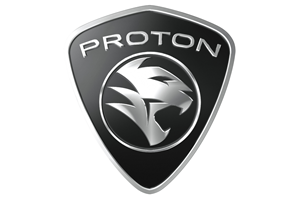A brief history of
Proton
Introduction
The car manufacturer Proton has made an important impact on the automotive world. In this article we will give a brief but detailed history of the Proton marque.
We will look at the origins of Proton looking at who, why, where and when Proton was founded. We'll look at the design of the iconic Proton logo and what are some the more significant Proton models.
We'll take a glance at what racing history the Proton has and who some of the most important people have been in the history of Proton over the years.
Who, where, when and why was
Proton founded?
Proton, a renowned car manufacturer based in Malaysia, was founded in 1983. The company was established as a joint venture between the Malaysian government and Mitsubishi Motors Corporation of Japan. The primary aim of Proton's formation was to create a national car brand for Malaysia, with the intention of stimulating the country's industrialization and economic growth. By developing a domestic automotive industry, Malaysia sought to reduce its dependency on imported vehicles and enhance its technological capabilities.
Proton's headquarters and main manufacturing facility are located in Shah Alam, Selangor, Malaysia. The company's early years were focused on the production of passenger cars, primarily targeting the local market. The launch of Proton Saga, the first model to roll off the production line, marked a significant milestone in Malaysia's automotive industry. It became a popular choice among Malaysians, offering a more affordable option compared to imported vehicles.
The founding of Proton was driven by multiple objectives. Firstly, it aimed to create employment opportunities in the automotive sector and foster the development of related industries in Malaysia. By establishing a domestic car manufacturing capability, the country aimed to retain automotive-related investments within its borders and develop a skilled workforce in the sector. Additionally, Proton was seen as a strategic tool for technological transfer and knowledge acquisition. Through collaborations with international partners like Mitsubishi, Proton aimed to acquire advanced automotive technologies and build its own research and development capabilities.
Over the years, Proton has expanded its product range and global presence. The company has entered into strategic partnerships with renowned automotive brands such as Lotus and Geely, which have further enhanced its technological expertise and product offerings. Today, Proton continues to play a significant role in the Malaysian automotive industry, contributing to the country's economy and providing Malaysians with a range of reliable and affordable vehicles.
How did the
Proton logo originate?

How did the Proton logo originate?
The logo of Proton, the Malaysian car manufacturer, has evolved over the years to represent the company's growth and progress. The initial logo featured a simple design with the word "Proton" written in uppercase letters, accompanied by a small emblem resembling a stylized letter "P." This logo symbolized the company's entry into the automotive industry and its ambition to establish a national car brand for Malaysia.
In the early 2000s, Proton introduced a new logo that represented a significant departure from its predecessor. The new logo featured a more modern and dynamic design, with the word "Proton" written in lowercase letters and enclosed within an oval shape. The oval shape was intended to symbolize motion and the forward-looking approach of the company. The logo also incorporated a stylized tiger head, representing strength, power, and the national identity of Malaysia.
As Proton continued to grow and forge strategic partnerships with international automotive brands, the logo underwent another transformation. In 2012, the company introduced a refreshed logo that showcased its collaboration with Lotus, a renowned British sports car manufacturer. The new logo featured the word "Proton" in bold lowercase letters, with a horizontal line cutting through the letter "O" to represent the influence of Lotus in the company's design and engineering.
The Proton logo represents the evolution and progress of the company over the years. It reflects Proton's commitment to innovation, quality, and its ambition to position itself as a competitive player in the global automotive market.
What are some of the significant
Proton models?
Proton, the Malaysian car manufacturer, has produced several significant models throughout its history, including high-performance vehicles that have gained recognition both locally and internationally. These models showcase Proton's commitment to engineering excellence and performance-driven design.
In the early years of Proton's history, the Proton Saga was introduced as the company's first model. Launched in 1985, it quickly became a popular choice among Malaysians. While the early Saga models were not specifically focused on high-performance, they laid the foundation for Proton's future endeavors in producing more powerful and sporty cars.
In the 1990s, Proton collaborated with Mitsubishi to develop the Proton Satria GTi. This hatchback model, introduced in 1998, was equipped with a 1.8-liter engine and featured sporty styling cues. The Satria GTi became a favorite among car enthusiasts and established Proton's reputation for producing performance-oriented vehicles.
Moving into the 2000s, Proton introduced the Proton Satria Neo R3. Developed by Proton's Motorsports division, R3, this model showcased enhanced performance and handling. With a sport-tuned suspension and a 1.6-liter CamPro engine, the Satria Neo R3 offered an exhilarating driving experience.
In recent years, Proton has continued to expand its range of high-performance models. The Proton Suprima S, introduced in 2013, featured a turbocharged engine and advanced safety features. It offered a blend of power, comfort, and technology, making it a compelling choice for performance enthusiasts.
More recently, Proton unveiled the Proton X70, its first SUV model. While not focused on high-performance, the X70 showcased Proton's ability to produce a stylish and technologically advanced vehicle that appealed to a wide range of customers.
These significant models from different periods of Proton's history demonstrate the company's ongoing commitment to producing vehicles with enhanced performance and driving dynamics. From the early days of the Saga to the latest offerings, Proton continues to evolve and deliver cars that cater to the needs and desires of car enthusiasts.

One of Proton's Most Iconic Models
Who are some of the most important people in
Proton's History
Behind Proton's success are the individuals who have contributed their expertise and leadership to the company. From visionary founders to talented engineers and designers, these people have played a crucial role in shaping Proton's growth and reputation in the automotive industry.
One of the most significant figures in Proton's history is Tun Dr. Mahathir Mohamad, Malaysia's former Prime Minister. He was instrumental in the establishment of Proton in 1983 as a strategic initiative to develop Malaysia's automotive industry. Tun Dr. Mahathir's vision and determination paved the way for Proton to become the country's first national car manufacturer.
Another key individual is Dato' Seri Syed Zainal Abidin, who served as the Managing Director of Proton from 2006 to 2012. Under his leadership, Proton underwent a major transformation, focusing on quality improvement and product development. Dato' Seri Syed Zainal Abidin led the company during a critical period and successfully implemented various initiatives to enhance Proton's competitiveness in the market.
Proton's success in producing high-performance cars can be attributed to the expertise of engineers and designers such as Tengku Djan Ley, who is a prominent figure in the motorsports scene in Malaysia. As the head of Proton's Motorsports division, Tengku Djan Ley played a key role in developing Proton's motorsports programs and enhancing the performance of Proton's road cars.
Furthermore, the contributions of skilled engineers like Dato' Abdul Rashid Musa, who was involved in the development of the Proton Waja and Proton Persona, have been invaluable. Their technical knowledge and dedication have helped shape the performance and reliability of Proton's vehicles.
Proton's design team has also played a vital role in creating visually appealing and distinctive models. One notable designer is Azlan Othman, who was responsible for the design of the Proton Prevé. His ability to blend aesthetic appeal with functional design elements has contributed to Proton's success in producing stylish and modern vehicles.
Lastly, the Proton dealerships and sales team have been instrumental in promoting and selling Proton vehicles to customers. Their commitment to providing excellent customer service and promoting the Proton brand has played a crucial role in Proton's market presence.
These individuals, along with many others who have contributed their talent and dedication, have been instrumental in Proton's journey and have helped establish the company as a significant player in the automotive industry. Their collective efforts and expertise continue to drive Proton's growth and success.

One of the most influential people in the history of Proton
Proton's Racing History
Proton's racing history is marked by its participation in various motorsports events, showcasing the performance and capabilities of its vehicles on the racing circuit. The company's involvement in motorsports has not only served as a platform to demonstrate its engineering prowess but has also played a significant role in enhancing the brand's image and attracting enthusiasts.
One of Proton's notable ventures into motorsports is its participation in the FIA Asia-Pacific Rally Championship (APRC). Proton competed in the APRC with its Proton Satria Neo S2000 rally car, a high-performance machine specifically designed for rally racing. The Satria Neo S2000 demonstrated exceptional performance and achieved notable success in the championship, with victories and podium finishes that showcased Proton's engineering capabilities.
In addition to rally racing, Proton has also ventured into circuit racing, particularly in touring car championships. The Proton Prevé, a popular model in the Proton lineup, has been the car of choice for Proton's participation in touring car competitions. Proton competed in renowned championships such as the British Touring Car Championship (BTCC) and the Malaysia Championship Series (MCS). These championships provided a platform for Proton to compete against other manufacturers, pushing the limits of its vehicles and showcasing their performance in highly competitive environments.
Proton's involvement in motorsports extended beyond professional racing events. The company also organized grassroots motorsports activities, including the Proton One-Make Race (POMR) series. The POMR series provided an opportunity for amateur racers and Proton owners to showcase their driving skills in a controlled and competitive environment. These events not only allowed Proton enthusiasts to experience the thrill of racing but also created a sense of camaraderie and community among Proton owners.
Furthermore, Proton's motorsports initiatives included support for young and aspiring racers through various programs and sponsorships. Proton's collaboration with the Sepang International Circuit (SIC) in Malaysia allowed promising young talents to compete in the Proton R3-MME Team, providing them with opportunities to hone their racing skills and gain valuable experience on a professional racing platform.
Proton's involvement in motorsports has not only showcased the performance and capabilities of its vehicles but has also contributed to the development of motorsports talent and enthusiast communities. By participating in a range of racing events and supporting grassroots initiatives, Proton has established a presence in the racing world and continues to be recognized as a manufacturer that combines performance and affordability.
Summary
Proton is a Malaysian car manufacturer that has established itself as a key player in the automotive industry. Founded in 1983, the company has since become a symbol of national pride, producing a range of vehicles that cater to various market segments. Proton's commitment to innovation, quality, and affordability has made it a popular choice among consumers, both in Malaysia and internationally.
Throughout its history, Proton has continually evolved and expanded its product lineup, introducing models that cater to different customer preferences and needs. The company's focus on developing high-quality vehicles has earned it recognition and accolades in the industry. Proton's strategic partnerships with renowned global automotive manufacturers, such as Geely, have further enhanced its capabilities and opened up new opportunities for growth and expansion.
Proton's success can be attributed to its strong emphasis on research and development, as well as its commitment to producing vehicles that meet the highest standards of safety, performance, and reliability. With a range of models that span various segments, from compact cars to SUVs, Proton continues to attract a diverse customer base. The company's dedication to technological advancements and its ability to adapt to changing market trends have positioned it as a competitive force in the global automotive market.
In addition to its focus on manufacturing quality vehicles, Proton has also made significant contributions to motorsports, participating in prestigious racing events and supporting grassroots initiatives. Proton's involvement in motorsports has not only showcased the performance and capabilities of its vehicles but has also nurtured talent and fostered a sense of community among racing enthusiasts. Through its commitment to excellence and continuous innovation, Proton has emerged as a prominent automotive brand that represents the spirit of Malaysian engineering and ingenuity.
View Proton Car Specifications
More Manufacturer Histories.

























